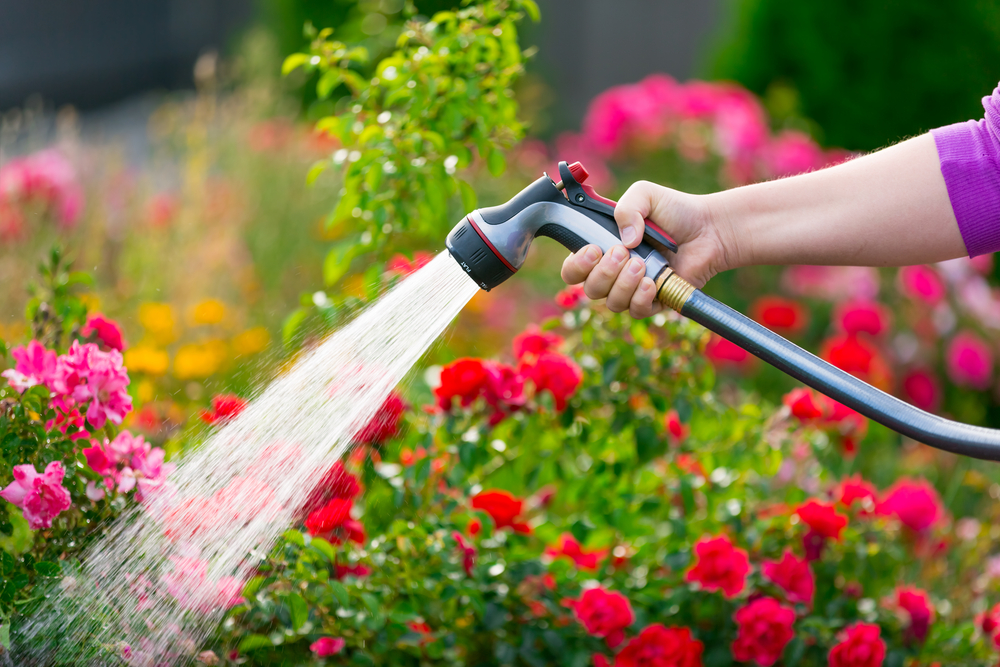
How to Protect Your Plants During a Summer Heatwave
By Tom Estabrook
Extreme summer temperatures can not only put stress on your plants, it can also create unsafe working conditions for you in the garden. With that in mind, we recommend taking the following precautions when the mercury rises...
Move Your Containers
The great thing about containers is that they're mobile. Whenever possible, we recommend moving containers, window boxes and hanging baskets into the shade during a summer heatwave. Just make sure not to leave them in an enclosed garage or shed where they will heat up during the day.
Keep your containers hydrated and mist them occasionally with water to reduce transpiration during the day. If your plants are not established or rooted out in your containers yet, more water may be needed. You should also stop any applications of fertilizer during a heatwave.
Water, Water, Water!
When it comes to garden plants that cannot be moved, water is crucial. Start watering ahead of incoming hot weather to heavily saturate the root systems and hydrate the soil. While using a sprinkler is tempting, hand watering is always best. This ensures that the water will get to the root system and provide the most benefits.
Continue watering multiple times a day to maintain water in the soil and around the root systems. You simply cannot overwater during a heatwave. However, remember to reduce your watering to 2-3 times a week when the weather cools back down.
Spraying down your plants or running short 5-10 minute bursts of a sprinkler during the heat of the day will also help cool your plants down and slow transpiration. However, remember that this is not a substitute for hand watering the root systems.
Caution: Make sure to run cool water through your hose first before using it directly on plants. Hot water in your hose can burn plants (and you)! A hose sitting in the sun for as few as 15 minutes can be an issue when temperatures climb into the high 80's and 90's.
Disease and Insects
Heat-stressed plants are more vulnerable to insect attacks and disease outbreaks. Keep a close eye on your garden for signs like curling leaves, discolored spots, holes, or sticky residue. These can indicate issues like aphids, spider mites, powdery mildew, or fungal infections.
Remove infected or infested leaves immediately and consider organic pest controls like neem oil or insecticidal soap for light infestations. For serious problems, stronger treatments may be necessary. Reducing moisture on leaves and avoiding overhead watering in the evening can also help limit fungal issues.
Herbs and Veggies
Edible plants need extra attention during hot weather to stay productive. Harvest frequently - especially herbs like basil, cilantro, and dill - to keep plants from bolting or going to seed too soon. Picking ripe vegetables also reduces plant stress and encourages continued production.
Be mindful of water needs for fruiting crops like tomatoes, cucumbers, and peppers. Inconsistent watering can lead to problems like blossom end rot. Provide some afternoon shade using row covers, umbrellas, or shade cloth to protect tender greens and prevent sunscald on fruits.
What About Lawns?
Keeping your grass green during a heatwave can often feel like a losing battle, but by focusing on problem areas and applying water early and often, you can come out ahead. We recommend setting up a sprinkler and saturating any area that tends to brown up in the summer ahead of soaring temperatures. Areas around pavement or patios will retain heat and dry out faster, so pay special attention there. Leach fields and any spot with sandy soils are also areas of concern. As the temperatures rise, continue to apply water and move the sprinklers as needed.
Houseplants in the Heat
Don't forget about your indoor plants during summer heatwaves! While they may be protected from direct sun, indoor temperatures near windows can still soar. Move your houseplants away from south- or west-facing windows to prevent leaf scorch and overheating.
Keep soil moisture consistent, and be sure pots aren't drying out faster than usual - especially in homes with air conditioning. Increasing humidity with pebble trays or humidifiers can also help tropical houseplants stay comfortable. And always check soil before watering to avoid overwatering in reaction to the heat.
Stay Safe!
Lastly, remember to water yourself! Drink lots of fluid, wear light colors and protect yourself with a sun hat whenever you're outdoors watering your plants. Plus, make sure to have plenty of water available for any furry friends too.
By following these tips, you can give your plants all the advantages to make it through summer heatwaves and continue to thrive.